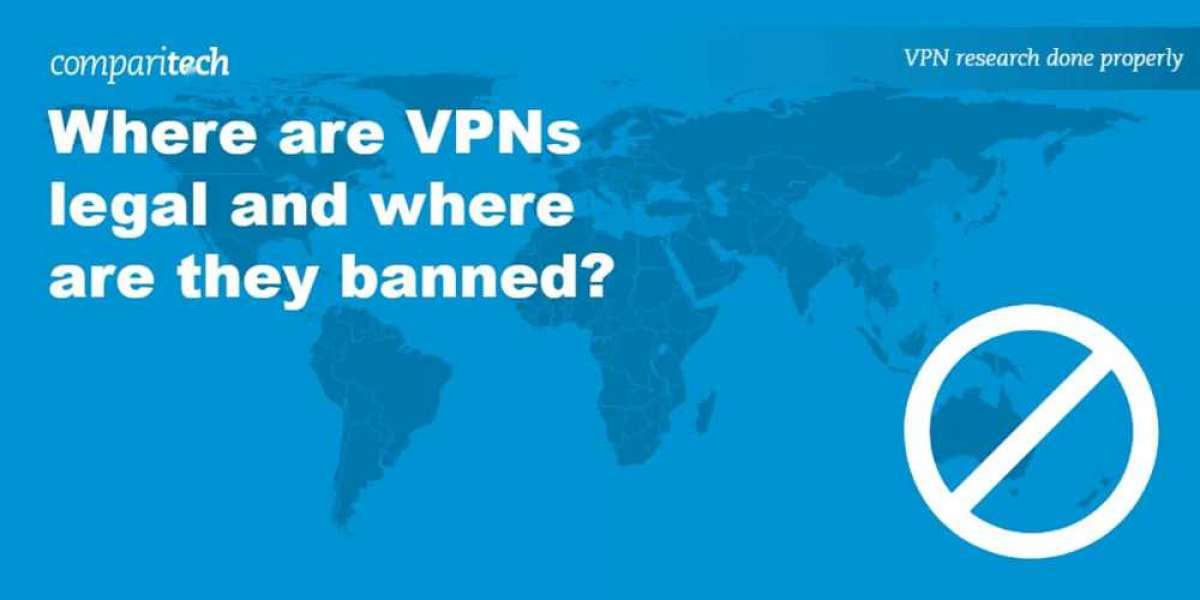Global VPN Legal Status
With the increasing global popularity of Virtual Private Networks (VPNs), it's essential to understand their legal status in different countries. These tools, which encrypt internet traffic and hide a user’s IP address, are often used for enhancing privacy and accessing geo-restricted content. While they offer numerous benefits, some nations have placed restrictions on their use, citing concerns over security and censorship.
In Afghanistan, despite a small percentage of internet users, VPNs are frequently employed due to the blocking of many websites. The government, while strict on sites related to gambling and alcohol, allows the legal use of VPNs.
Albania upholds freedom of speech and press, with no government-imposed censorship on the internet. An Albanian domain registrar recently blocked a controversial neo-Nazi site, but this was an independent decision, not a government mandate. VPNs are legal in Albania.
Algeria has a history of government-imposed site blocks, including political and social media content. ISPs are required to monitor online activities, and posting certain content can lead to criminal charges. Despite these restrictions, using a VPN is legal in Algeria.
Andorra, as per the 2016 Human Rights Report, does not restrict or censor internet access, and there are no reports of unauthorized monitoring. This country supports uncensored internet use and permits the use of VPNs.
Angola, although it has a history of internet censorship, allows the legal use of VPNs. In 2016, the president passed a controversial Press Law, which raised concerns about free speech.
Antigua and Barbuda provide unrestricted internet access, and there are no bans on VPN usage.
Argentina permits the use of VPNs, and several providers offer servers in the country. Although there have been proposed laws for online censorship, they have not yet been implemented.
Armenia allows the legal use of VPNs, though there are concerns about internet filtering and occasional site blocks during political unrest.
Aruba’s citizens can use the internet without restrictions, and VPNs are legal.
Australia, despite its reputation for less stringent censorship, allows the government to block certain sites, such as those used for torrenting. Telecom companies must also record user data. As a result, VPNs are popular and legal in Australia.
Austria ensures the protection of free speech and press, and the use of VPNs is legal.
Azerbaijan, known for arresting and punishing activists, censors the internet, including social media and independent news outlets. However, there are no reports of legal restrictions on VPN usage.
The Bahamas allow legal use of VPNs, though there have been attempts at introducing censorship.
Bahrain, despite having internet censorship, permits the legal use of VPNs. The government centralized its restrictive powers under the Telecommunications Regulatory Authority (TRA), which controls a website-blocking system.
Bangladesh, where the government has banned sites like Facebook and occasionally shut down the internet, allows the legal use of VPNs.
Barbados provides unrestricted internet access, and the use of VPNs is legal.
Belarus has attempted to crack down on anonymizing technologies, including banning Tor and adding VPNs to a list of sites with limited access. While not illegal, using a VPN can result in fines if detected.
Belgium allows the legal use of VPNs, though there have been reports of internet censorship.
Belize, which has seen government blocks on VoIP services, permits the legal use of VPNs.
Benin offers unrestricted internet access, and the use of VPNs is legal.
Bhutan, while allowing the legal use of VPNs, imposes restrictions on content that contradicts its moral beliefs.
Bolivia, where the government enforces censorship, particularly on the press and social media, permits the legal use of VPNs.
Bosnia and Herzegovina, which has tried to criminalize certain social media activities, currently has no internet censorship. The use of VPNs is legal here.
Botswana provides unrestricted internet access, and the use of VPNs is legal.
Brazil, despite some issues with internet censorship, allows the legal use of VPNs. The government attempted to introduce restrictions in 2016, and there was a temporary WhatsApp ban in 2015, which was quickly overturned.
Brunei, where citizens are subject to government monitoring and potential charges for social media posts, permits the legal use of VPNs.
Bulgaria, while allowing the legal use of VPNs, seeks more control over internet usage and monitors online activity.
Burkina Faso, with limited internet usage, allows unrestricted access and the legal use of VPNs.
Burundi, where only a small portion of the population uses the internet, subjects users to censorship and has banned social media platforms like WhatsApp during times of unrest. The use of VPNs is legal.
Cambodia, with a history of internet monitoring and censorship, allows the legal use of VPNs. The government actively suppresses free speech and has arrested opposition members for social media posts.
Cameroon, known for multiple internet shutdowns, particularly in anglophone regions, and active preaching against social media, still allows the legal use of VPNs.
Digital privacy tools face varied global reception
In Estonia, VPN legality aligns with its top-ranked internet freedom status
China's firewall battles tech-savvy citizens using cloaked VPN protocols
Ethiopia permits VPNs despite criminalizing VoIP with harsh prison terms
Germany allows circumvention tools amid social media censorship debates
Middle Eastern nations show contrasting approaches
Egypt legally permits VPNs despite blocking voice call services nationwide
Israel maintains open access with no VPN restrictions reported
Iran actively blocks VPN traffic while maintaining ambiguous legality
African states demonstrate political influences on connectivity
Chad experiences election-period blackouts while keeping VPNs lawful
Gabon enforces digital curfews but doesn't prohibit privacy software
Ghana faces criticism for temporary social media shutdowns
European regulations reveal surveillance tensions
France balances anti-terror monitoring with GDPR privacy protections
Hungary's encryption ban proposals contrast with permitted VPN usage
Denmark accidentally blocked major platforms during filtering attempts
Caribbean and island nations generally permit VPN access
Cuba allows VPNs despite revolutionary website restrictions
Dominican Republic enjoys uncensored web with legal privacy tools
Jamaica maintains open networks without digital rights conflicts
Asia presents extreme regulatory contrasts
North Korea completely prohibits unauthorized internet access
Vietnam requires government-approved VPN services only
Philippines permits unrestricted usage despite surveillance concerns
Data retention laws spark controversy in the Americas
Chile faces criticism over evolving but vague monitoring policies
Brazil implements increasing data localization requirements
Mexico struggles with cartel-related online monitoring
Oceania nations show minimal restrictions
Australia debates encryption laws while keeping VPNs legal
New Zealand maintains strong privacy protections overall
Fiji enjoys open access without censorship barriers
Post-Soviet states exhibit evolving digital landscapes
Georgia strengthened user privacy through 2017 legislation
Kazakhstan implements intermittent social media blocks
Belarus faces criticism for opposition website takedowns
Scandinavian models prioritize user rights
Norway rejects data retention mandates despite EU pressure
Sweden combines open access with anti-piracy enforcement
Iceland remains global leader in censorship-free networks
War-torn regions face unique challenges
Syria experiences infrastructure damage limiting VPN effectiveness
Yemen's fractured networks complicate digital privacy efforts
Libya's competing governments enforce regional blocks
Corporate influences shape North American policies
Canadian telecom giants lobby for VPN restrictions
US maintains legal status despite industry pressure
Mexico faces corporate data sharing controversies
Religious states impose moral-based filtering
Saudi Arabia blocks VoIP while allowing limited VPN use
Pakistan intermittently restricts "immoral" content
Indonesia targets gambling sites through ISP blocks
Data sovereignty drives Asian regulations
Russia mandates local server storage for user information
India proposes strict localization requirements
Malaysia balances Islamic values with tech growth
Authoritarian regimes employ advanced detection
Turkmenistan monitors internet cafes for VPN usage
Uzbekistan relaxed restrictions after leadership changes
Azerbaijan targets activists through connection logs
Taxation models emerge as control mechanisms
Colombia imposes crypto earnings levies
Portugal explores VPN service taxation
South Africa debates bandwidth-based pricing
Pandemic-era shifts impact global policies
Bangladesh expanded surveillance during health crisis
Thailand tightened lèse-majesté enforcement online
Peru invested in citizen monitoring infrastructure
Technological arms race continues evolving
Iran develops domestic VPN alternatives
China tests AI-driven traffic analysis
Global providers innovate obfuscation methods
Legal loopholes enable circumvention
Cambodia permits VPNs despite press freedom issues
Laos maintains unrestricted but underdeveloped networks
Myanmar's military junta targets encrypted services
International agreements create complexity
EU members debate cross-border data rules
Five Eyes alliance shares surveillance intelligence
African Union develops cybersecurity framework
Corporate compliance challenges persist
Multinationals navigate conflicting national laws
Tech giants face pressure for backdoor access
ISP cooperation with governments remains controversial
Citizen adaptation drives innovation
Hong Kong residents utilize VPNs for mainland access
Taiwan balances Chinese pressure with open internet
Macau's gambling industry requires secure connections
Developing nations face infrastructure hurdles
Mali struggles with unreliable electricity supplies
Nepal's mountainous terrain limits connectivity
Papua New Guinea relies on satellite links
Global VPN usage trends upward
Privacy concerns outweigh legal uncertainties
Work-from-home culture accelerates adoption
Streaming geo-restrictions drive consumer demand
Legal landscapes remain in flux
Ongoing court cases challenge state surveillance
Lobby groups push for standardized regulations
Activist organizations fight for digital rights
Technological literacy gaps persist
Elderly populations struggle with encryption tools
Developing regions lack cybersecurity education
Urban-rural divides in digital access remain
Corporate VPN usage complicates regulations
Business needs conflict with national security
Remote work infrastructure requires secure channels
Industrial espionage concerns grow
Cryptocurrency ties influence policies
Venezuela promotes Petro coin through controlled access
El Salvador's Bitcoin adoption raises security questions
Nigeria combats crypto scams via website blocks
Global tensions shape cyber policies
US-China trade wars impact tech regulations
Russia-Ukraine conflict spurs digital defenses
Middle East conflicts drive surveillance tech growth
Environmental factors play unexpected roles
Arctic circle data center locations gain popularity
Developing nations face climate-related outages
Green energy initiatives impact server farms
Legal enforcement varies widely
Singapore imposes strict copyright penalties
Dubai focuses on financial crime prevention
Greece prioritizes anti-defamation measures
Cultural values influence restrictions
Turkey balances secularism with Islamic values
Israel navigates security vs privacy debates
Japan maintains unique content moderation approaches
Emerging technologies complicate regulation
5G networks enable faster detection methods
Quantum computing threatens current encryption
Blockchain-based VPNs challenge traditional models
Personal security concerns dominate
Journalists rely on multi-hop configurations
Activists prioritize burner devices
Diplomats use embassy-protected networks
Global governance remains fragmented
UN initiatives face implementation challenges
Regional alliances develop conflicting standards
Sovereign internet proposals gain traction
Public opinion shifts gradually
Privacy awareness increases post-Snowden
Younger generations demand digital rights
Developing nations prioritize access over security
Techno-optimism persists despite challenges
Decentralized web projects emerge
Mesh networks bypass traditional ISPs
Open-source tools gain popularity
Economic factors drive adoption
E-commerce requires secure transactions
Digital nomads rely on location spoofing
Developing markets embrace affordable solutions
Legal ambiguities create risks
Travelers face border device searches
Multi-jurisdictional services complicate compliance
Extraterritorial laws create enforcement nightmares
Future trends indicate complexity
AI-driven adaptive filtering evolves
Biometric authentication complicates anonymity
Global digital ID systems emerge
Individual responsibility increases
Password managers become essential
Two-factor authentication standardizes
Security awareness training proliferates
Corporate accountability grows
Data breach disclosure laws strengthen
Supply chain security prioritized
Cyber insurance markets expand
Technological parity remains elusive
Wealthy nations develop superior tools
Developing countries rely on outdated software
Digital divide continues widening
Ethical considerations gain prominence
OpenVPN debates warrant canary provisions
Logging policies face public scrutiny
Free tier services question sustainability
Global citizenship redefines access
Stateless digital services emerge
Blockchain-based identities tested
Universal basic bandwidth proposed
Human rights frameworks adapt
UN declares internet access fundamental right
Digital privacy recognized in constitutions
Cross-border data treaties negotiated
Technical literacy becomes crucial
Coding education expands globally
Cybersecurity career paths multiply
Ethical hacking gains legitimacy
Surveillance capitalism faces backlash
Data monetization models challenged
Ad-blocking usage increases
Alternative revenue streams explored
Decentralization efforts accelerate
Blockchain-based DNS systems tested
Peer-to-peer networks revive
Distributed storage solutions grow
Quantum era preparations begin
Post-quantum encryption standardized
Key rotation practices updated
Legacy systems face upgrade pressures
Global cooperation remains essential
Cybercrime treaties negotiated
Ransomware task forces formed
Critical infrastructure protections aligned
Individual empowerment continues
Self-hosted VPN solutions popularize
Custom firmware gains traction
Community networks expand
Regulatory challenges multiply
Metaverse jurisdictions debated
IoT security standards developed
AI content moderation scrutinized
Technological determinism questioned
Digital minimalism movements grow
Screen time reduction apps proliferate
Analog alternatives rediscovered
Sustainable practices emerge
Green web hosting options expand
Low-power devices gain popularity
E-waste recycling initiatives strengthen
Cultural preservation adapts
Indigenous knowledge digitized securely
Minority language platforms develop
Digital heritage projects multiply
Accessibility improvements continue
Screen reader compatibility prioritized
Captioning tools standardized
Adaptive interfaces mainstreamed
Psychological impacts studied
Digital detox retreats popularize
Cyber anxiety therapies develop
Attention economy critiques deepen
Philosophical debates intensify
Digital rights vs state security
Privacy vs convenience tradeoffs
Anonymity vs accountability balance
Global citizenship reimagined
Digital nomad visas proliferate
E-residency programs expand
Virtual nation concepts tested
Historical perspectives inform
Crypto wars lessons revisited
Early internet ideals examined
Surveillance state origins analyzed
Speculative futures envisioned
Neural interface privacy debated
DNA-based encryption researched
Quantum tunneling security explored
Continuous adaptation required
Zero-trust models adopted
Threat intelligence shared
Security hygiene prioritized
Individual vigilance essential
Regular software updates enforced
Phishing awareness critical
Backup practices standardized
Collective action necessary
Digital rights organizations unite
Consumer protection laws updated
Whistleblower protections strengthened
Uncertain future embraced
Technological optimism tempered
Ethical frameworks developed
Human-centric design prioritized
Global VPN Regulatory Landscape
Global VPN regulations reveal a complex legal landscape shaped by surveillance priorities and content control.
In Asia-Pacific, India mandates VPN providers to log user data since 2022, prompting service exits despite legal usage.
Myanmar’s military regime enforces draconian measures: proposed cybersecurity laws criminalize unauthorized VPN possession with three-year prison terms, even pre-enactment.
Middle Eastern nations exhibit stark contrasts. Iran permits state-approved VPNs only,
rendering them ineffective for bypassing censorship, while Iraq enforces total VPN bans to counter extremist digital activities.
Jordan temporarily blocked major VPN services in 2021 to restrict access to platforms like Clubhouse.








